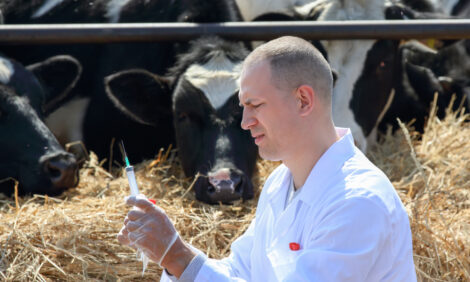



Ticks Do Battle Against Unique Control Measure
AUSTRALIA - Scientists believe they may be a step closer to finding a cattle tick vaccine that could save the national cattle and dairy industries approximately A$175 million per annum and reduce the need for pesticides.Using a novel science that has not been carried out anywhere else in the world, researchers have pinpointed tick vaccine antigens that will enable cattle to resist tick infestations.
The vaccine antigens produce a bovine immune response that interferes with tick attachment and feeding (reducing tick numbers by up to 60 per cent) and also interferes with the ability of surviving ticks to lay eggs.
The research, which is being led by the Queensland Alliance for Agriculture and Food Innovation (QAAFI), The University of Queensland and the CRC for Beef Genetic Technologies, recently recorded 50 to 87 per cent protection from ticks in cattle trials using pre-optimised immunisation conditions.
This outcome has caught the attention of commercial companies and highly regarded scientific journals alike.
According to QAAFI scientist, Dr Ala Lew-Tabor, tick management and losses due to the parasite costs the national cattle and dairy industries approximately A$175 million per annum.
“In 2008, Meat and Livestock Australia pinpointed tick infestation as the ‘number one' cattle health problem in the country,” Dr Lew-Tabor said.
“In recent years traditional means of controlling ticks (using anti-tick pesticides called acaricides) is slowly declining due to ticks developing resistance to the available classes of acaricides."
“During our five-year research programme, we have developed new tick research tools, generated 10 times more tick genomic data and established a specific bioinformatics capacity through Murdoch University's Centre for Comparative Genomics.”
Dr Heather Burrow, CEO of the Beef Genetic Technologies CRC, said that reduced productivity in the beef and dairy industries due to tick infestation is currently one of the most costly and difficult management issues and has high impacts on cattle welfare.
“This work is novel science that has not been carried out anywhere else in the world. Together with our US and Brazilian partners, Australia stands to lead the way in safe and effective tick management,” Dr Burrow said.
As part of the study, Dr Ala Lew-Tabor and her team fed adult ticks with antibodies to these corresponding genes with the overarching aim of identifying a safe and effective alternative means of reducing cattle and dairy disease caused by Australia's most common species of tick.
Dr Lew-Tabor said that while the project team had made excellent progress through the discovery and testing of these potential tick vaccine candidates, a commercial product is still a few years away.
”Once potential vaccine candidates are licensed to a pharmaceutical company to develop into a commercial vaccine, it takes approximately five to eight years to complete registration requirements for use in Australia and overseas.”
Partners in the tick research project includes the Queensland Government's Department of Employment, Economic Development and Innovation (DEEDI), Murdoch University's Centre for Comparative Genomics, Perth, the US Department of Agriculture – Agricultural Research Services, and The Brazilian Agricultural Research Corporation (EMBRAPA).
The group of scientists have used and refined tick gene silencing techniques to help them screen for vaccine antigens that will suspend the tick life cycle.
Dr Lew-Tabor's team's research was recently published in an article,‘Gene expression evidence for off-target effects caused by RNA interference-mediated gene silencing of Ubiquitin-63E in the cattle tick Rhipicephalus microplus', in the International Journal for Parasitology (as Issue 9's ‘highlighted article') and this will guide other tick researchers in the development of gene silencing treatments. Dr Lew-Tabor has also been appointed a Specialist Editor for the Journal.
TheCattleSite News Desk


